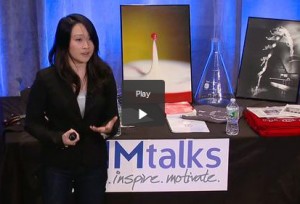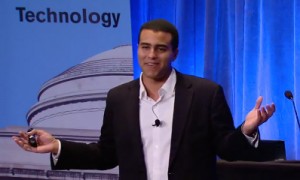Recommended
A call went out for students who have invented, implemented, succeeded, or failed at a wide range of ventures or ideas to tell their stories. Students teed up and launched TIMtalks at a May 16 event introduced by MIT Chancellor Eric Grimson PhD '80. Watch the talks (about 15 minutes)—or try these samples:
Kanjun Qiu '12 talked about Expanding the Culture of Computing. According to Qiu, in 1985 some 37 percent of undergraduate computer science degrees were awarded to women. By 2010, when the computation world had vastly expanded, the percentage had actually dropped—to 11 percent.
Why did that happened? "Not because women lost interest but because women lost confidence," she says.
Qiu, who has begun graduate work in the Media Lab, is involved in a new field that is attracting female students—computational textiles, which combines electronics into fabric and paper using conductive thread. Basically, she sews computers together.
"In the MIT Media Lab, I teach electronics and I don't force people into traditional computer science modes," she says. "I believe we need to provide new avenues and entry points into computer science. If you change the idea of what electronics should look like, it changes the people who are willing to get involved."
Omar Abudayyeh '12 talked about Drugging the Undruggable: The Road Not Taken. His focused on his efforts to combat disease by tackling a stubborn problem: only 2 percent of the proteins involved in major diseases can be targeted with current techniques.
"Most major diseases do not have definition cures," Abudayyeh says. "Spending on drugs is increasing by billions every year, but the number of drugs approved is dropping every year. The trend is only going to get worse."
He began knocking on doors to get access to labs—even before his first freshman class—and he got lots of nos in response. But he only needed one yes, and he got that. He has subsequently developed a nanoparticle-based vaccine that can use the hosts' immune system to target tumors and he is now working on a nanoparticle-based urine test for all major diseases. His next challenge, as he begins Harvard Medical School next fall: making a better protein-sequencing technology to increase the number of proteins that can be targeted in new treatments.








